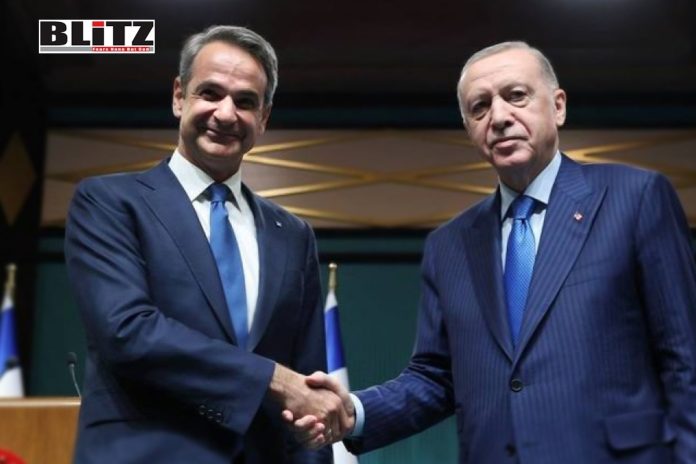Greek Prime Minister Kyriakos Mitsotakis made a significant six-hour visit to Turkiye last week, reciprocating Turkish President Recep Tayyip Erdogan’s visit from December. This meeting marks a noteworthy period of relative calm between the historically contentious neighbors, despite some critical voices emerging from opposition parties in Greece. Greek media outlets emphasized the generally warm atmosphere of the discussions. The two leaders met with only their interpreters present, allowing them to delve deeply into a wide range of critical issues.
The historical context of Turkiye-Greek relations is deeply rooted in Greece’s declaration of independence from the Ottoman Empire in 1821. Since then, Greece has progressively expanded its borders, often at the expense of Turkiye. Presently, Greece is seeking control over uninhabited rocks and geographic formations that are in close proximity to the Anatolian mainland yet hundreds of miles from the Greek mainland. The Treaty of Lausanne, which established the current borders between the two countries, stipulates that if an island is not specifically named in an agreement, it reverts to its original owner.
Former Greek Prime Minister Konstantinos Karamanlis once brought attention to this issue by posing a rhetorical question about Greek sentiments if an island in Piraeus harbor were to belong to Turkiye. This question underscores the sensitive nature of territorial disputes between the two countries. Nevertheless, Turkish-Greek relations possess the potential and means to improve if wise and strong governments are in power in both nations. In recent years, Turkiye employed a threatening tone, epitomized by the refrain of a Turkish song, “We may come one night all of a sudden.” Conversely, Mitsotakis used his platform in the US Congress to place all types of blame on Turkiye. Fortunately, both leaders have recently adopted a more measured and calm demeanor, ushering in a period of relative stability. While major issues such as the delimitation of the continental shelf, the width of territorial waters, and air traffic control remain taboo and unresolved, they are set aside for future, more reasoned discussions.
Key topics at this year’s meeting included the renovation of Istanbul’s Kariye (Chora) Church. Originally built in the fourth century, the church became a mosque in 1511 following the Ottoman conquest of Istanbul. In 1948, a restoration program sponsored by the Byzantine Institute of America and the Dumbarton Oaks Center for Byzantine Studies transformed it into a museum. However, in 2020, Erdogan’s government reconverted it into a mosque. Despite Mitsotakis raising this issue, there is little chance that Erdogan will alter its status.
There is a striking imbalance between the number of mosques in Athens and churches in Istanbul. While the Greek Orthodox Church’s Ecumenical Patriarchate operates in Istanbul with numerous churches scattered throughout the city, Athens had no mosque until 2020. This disparity underscores the cultural and religious differences that continue to influence relations between the two countries.
Mitsotakis carefully avoided any reference to the Turkish minority in Greece. The two countries have different perceptions regarding the Turkish minority in Western Thrace. Mitsotakis consistently referred to them as the Muslim minority, despite the fact that the Muslim minority in Greece is composed mainly of ethnic Turks, with a few exceptions. There is a clear imbalance between the size of the Turkish minority in Greece and the Greek minority in Turkiye, which is predominantly located in Istanbul and the islands of Imbros and Tenedos near the Dardanelles. The Greek minority in Turkiye has been decreasing steadily and may face extinction in a few generations. In contrast, the Turkish minority in Greece remains substantial.
The Gaza conflict emerged as a particularly contentious issue during the talks. Erdogan mentioned that over 1,000 Hamas members were receiving treatment in Turkish hospitals. Mitsotakis reiterated his government’s stance that considers Hamas a terrorist organization, whereas Erdogan views it as the legitimate representative of the Palestinian people. Both leaders stood firm on their positions, and Erdogan elaborated further on Turkiye’s stance on Hamas. Ultimately, the parties had no choice but to agree to disagree on this matter.
On the issue of Cyprus, Erdogan and Mitsotakis also have divergent views. Turkiye advocates for a solution based on the current realities on the island, meaning a two-state solution. In contrast, Mitsotakis believes that any solution should be grounded in UN parameters.
In a statement to the Greek newspaper Kathimerini, Erdogan expressed optimism about Turkish-Greek relations, stating that they had reached their highest level thanks to the Athens Declaration signed last year. He also assured that Greece’s project to establish maritime park areas in various parts of the Aegean and Ionian seas would not harm bilateral relations. Regarding hydrocarbon cooperation, Erdogan emphasized that this should be an area of cooperation rather than confrontation, warning that an energy platform in the Eastern Mediterranean that excludes Turkiye would create a significant vacuum.
Erdogan also commented on the American role in Turkish-Greek relations, asserting that the two countries have their own effective communication channels and do not need external mediation. To maintain and improve the dialogue between Turkiye and Greece, both leaders agreed that a low-profile approach would be most effective.




